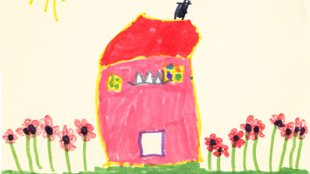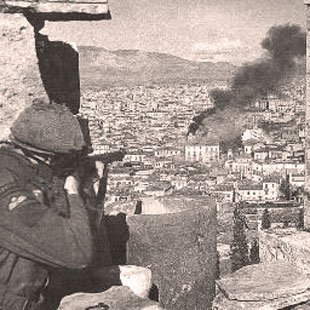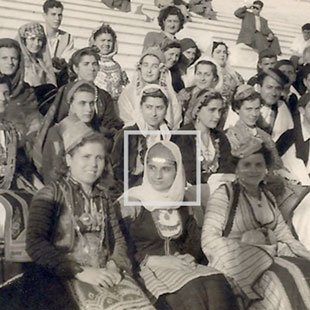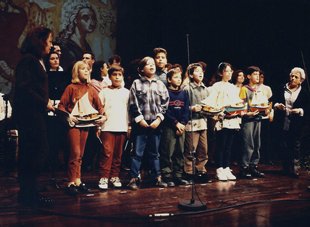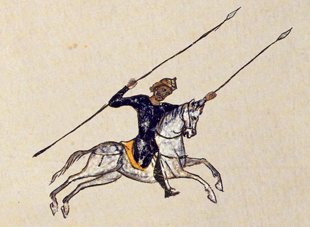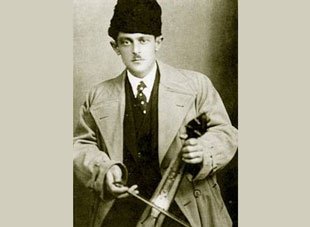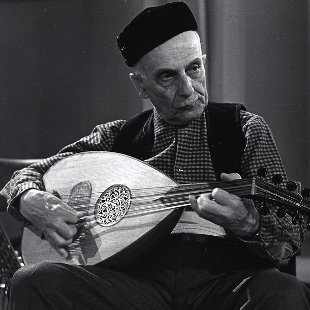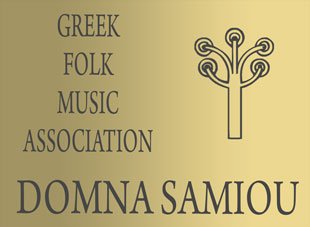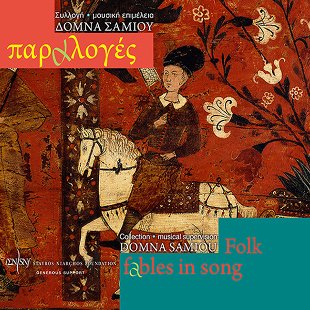You are at: Home page Her Work List of Songs The Dead Brother
Του νεκρού αδελφού
Listen
Lyrics
What a mother, vai aman aman, what a fine mother,
what a mother, ela giareni mou ela, what a fine mother
is she with, vai aman aman, with the nine sons
and, ela giareni mou ela, the only daughter.
Matchmakers came from Babylon
to take Areti far away to foreign lands.
Her mother was against it, but Konstantis was for the match.
– Konstantis, how can I send our Areti away to foreign parts?
There’ll come a time, some accursed year,
when her mother weeps for Areti and Areti for her mother.
– Give up her hand, mother, and I myself will fetch her back.
So they married Areti off far away in a foreign land.
When all her brothers died, Konstantis last of all,
their mother’d walk from grave to grave, weeping and singing dirges
and when she got to Konstantis’ stone,
she’d weep and curse his name.
– Be damned, Konstantis, be thrice-damned
for making me marry Areti off in a foreign land.
[And with all the damning and the cursing
Konstantis rose up to go fetch Areti.
He turned his grave into a steed, his coffin into a saddle
and the cross at his head into a road to take him there.
All along the way, he beseeched the Lord,
– Dear God, let me find Areti dancing at the dance,
and he found her just as he had asked.
Spying her from afar, he shouting from up closer:
– Come, Areti, our mother needs you, girl.
– If it’s glad tidings you summon me for, I’ll don my finest,
if it’s for bad tidings, sackcloth and ashes shall be my garb.
– Come Areti, and travel as you are.
Along the way, riding the road home
a bird flew down and sat upon a branch.
Its song was not a bird’s or swallow’s song
for it sang in human voice, saying:
– Who has ever seen the like, the living and the dead together?
– Did you hear? Konstantis, did you hear the bird say
‘Who’s ever seen the like, the living and the dead together’?
– Don’t mind their talk; they are but birds and birds will sing.
Now get off home to mother who will let you in,
while I go tether my horse and join you there.
And Areti went to the door and shouted
– Open up, mother, open up, ’tis I, your Areti.
– If you are Areti, who brought you here?
– Konstantis brought me, now gone to tether his mount.
– Konstantis is dead these twelve long years.
– Open up, mother, open up. I am your Areti.
She opened the door, they embraced
and died in one another’s arms.]
Translated by Michael Eleftheriou
Original Lyrics
Του νεκρού αδελφού
Το τραγούδι της Αρετής
Σαν τη μάνα, βάι αμάν αμάν, σαν τη μάνα, καλή μάνα,
ν-έλα γιαρένη1 μ’ έλα, και τι καλή μανούλα
ν-από ’χει τους, βάι αμάν αμάν, από ’χει τους εννιά τους γιους
ν-έλα γιαρένη μ’ έλα, και μουναχή τη γκόρη.
Προξενητάδις έρχουντι ν-από τη Βαβυλώνα
να πάρουνι την Αρετή πουλύ μακριά στα ξένα.
Κι η μάνα δεν την έδινι κι ι Κουσταντής τη δίνει.
– Πώς να τη δώσου Κουσταντή την Αρετή στα ξένα
ν-απού θα ν-έρθ’ ένας κιρός, κατακαημένος χρόνος,
θα κλαίει η μάνα γι’ Αρετή κι η Αρετή για μάνα.
– Δώσ’ τηνα μάνα, δώσ’ τηνα, ν-εγώ θα τηνε φέρω.
Την έδωσαν την Αρετή πουλύ μακρυά στα ξένα.
Ούλα τ’ αδέρφια του μπροστά κι ι Κουσταντής πιθαίνει.
Σ’ όλα τα μνήματα πααίν’ κλαίει, μοιρολογάει,
στου Κουσταντή σαν πάηνι, κλαίει και βλαστημάει.
– Ανάθεμά σε Κουσταντή και τρισανάθεμά σε
που μ’ έκανες κι έδουσα την Αρετή στα ξένα.
[’Πού τις πουλλές τις βλαστημιές, ’πού τις πουλλές κατάρις
ι Κουσταντής σηκώθικι την Αρετή να φέρει.
Κάνει του μνήμα άλουγου κι του σιντούκι σέλα
κι του σταυρό της κιφαλής δρόμου που θα τουν πάγει.
Στουν δρόμου απού πάηνι όλο πιρικαλούσι
– Θε μου να βρω την Αρετή στου χουρό να χουρεύει.
Κι όπως πιρικάλισι έτσ’ πήγι κι την βρήκι.
’Πού μακριά ν-ιστάθηκι κι από κουντά φουνάζει:
– Άιντι, άιντι μαρ’ Αρετή, η μάνα μας σι θέλει.
– Αν μι φουνάζει για καλό να βάλου τα καλά μου
κι αν μι φουνάζει για κακό να βάλου τα λερά μου.
– Άιντι, άιντι μαρ’ Αρετή, έτσ’ που ’σι έτσ’ να πάμι.
Στου δρόμου που πααίνουνι, τη στράτα που διαβαίνουν,
πουλί πήγι κι κόνιψι πα στου δεντρού την τσούτα2.
Δεν κιλαϊδούσι σαν πουλί, ούτι σα χιλιδόνι,
μόν’ κιλαϊδούσι κι ίλιγι ανθρουπινή φουνίτσα.
– Πού είδγιτι, πού άκ’σιτι ζ’ντανοί μι τ’ς πιθαμένοι.
– Ακούς, ακούς βρε Κουσταντή, τι λέει του πουλάκι;
Πού είδγιτι, πού άκ’σιτι ζ’ντανοί μι τ’ς πιθαμένοι.
– Άιντι, άιντι μαρ’ Αρετή, πουλιά είνι κι ας τα λένι.
Ισύ πάηνι στου σπίτι μας, στη μάνα να σ’ ανοίξει
κι ’γώ θα δέσου τ’ άλουγου κι ύστιρα θα ν-έρθου.
Ιπήγι κι η Αρετή στη μπόρτα κι φουνάζει:
– Άνοιξι μάνα, άνοιξι, ιγώ είμ’ η Αρετή σου.
– Αν είσι ’σύ η Αριτή κι ποιος θι να σι φέρει;
– Ι Κουσταντής μι ίφιρι τ’ άλουγού τ’ πάει να δέσει.
– Ι Κουσταντής ιπέθανι, τώρα είν’ δώδικα χρόνια.
– Άνοιξι μάνα, άνοιξι, ιγώ είμ’ η Αρετή σου.
Ανοίγει κι αγκαλιάζουντι, μαζί κι οι δυο πιθαίνουν.]
1γιαρένης: ωραίος, λεβέντης, αγαπητικός
2τσούτα: κορυφή
Information
- Region: Eastern Thrace & Roumelia
- Categories: Fable Song (Ballad)
- Rhythm: 6 beats
- Dance style: Zonaradikos
- Duration: 05:08
Collaborators
- Singer: Vangelis Dimoudis
- Kaval: Alexandros Arkadopoulos
- Gaida (bagpipe): Yiorgos Makris
- Constantinopolitan lute: Socrates Sinopoulos
- Goblet drum: Manousos Klapakis
- Informant (source of the song): Traiani and Theodor Pitsanis
Albums
Notes
Also known as the song of Areti, it and Arta’s bridge are the best-loved and most Balkan –or, rather, pan-Balkan– of all the dramatic narrative songs in the folk repertoire. The song draws our attention to the culture shared by peoples separated by such much else. There has been a good deal of academic discussion centring both on the origins of the song and the manifold ideas and mythological elements it contains: the power of an oath, of mourning and of a curse; returning from the dead; the birds that talk; and, above all, perceptions of emigration and life in lands unknown, a concept which is conflated with death– all themes which reflect the shared fate of the peoples who loved the song and sang it. Known, too, in the form of a fairytale, the sung myth has inspired many Greek, Balkan and European writers, confirming the view that it is one of the crowning achievement of the anonymous folk poetry of the region. (See also The dead brother (Meli, Erythrae, Asia Minor)). Miranda Terzopoulou (2008)
Recording information
Studio recording, 2006.
It was collected in the 1970s by Yiorgos Amarantidis from Traiani and Theodor Pitsanis, a married couple, during their stay in Athens in order to make some appearances at the Dora Stratou Theatre. Traiani and Theodor Pitsanis, residents of the village of Kitros in Pieria, were refugees from Bana, Eastern Rumelia. Yiorgos Amarantidis handed the tape with the collected songs to Domna Samiou for inclusion in her archive.
Member Comments
Post a comment
See also
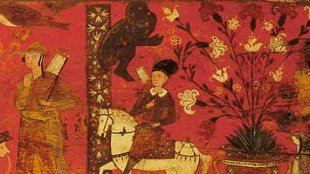
Song
I Passed by and Bade Good Day


Song
Giannos and Vangelio

Song
No Father Had I
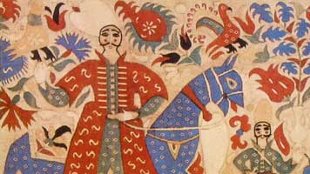
Song
The Love of Yannos and Marigo
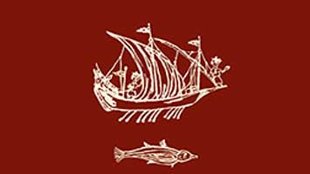
Song
You Drive Me Mother out from Home

Song
A Festival Is Being Held

Song
A Trader Made His Way

Song
Dawn Glowed in the East
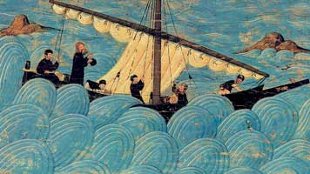
Song
Down on the Sandy Beach

Song
Evyenoula

Song
Forty Stonemasons

Song
My Son, Why Dont You Go and Wash?

Song
One Easter Day, One Sunday
